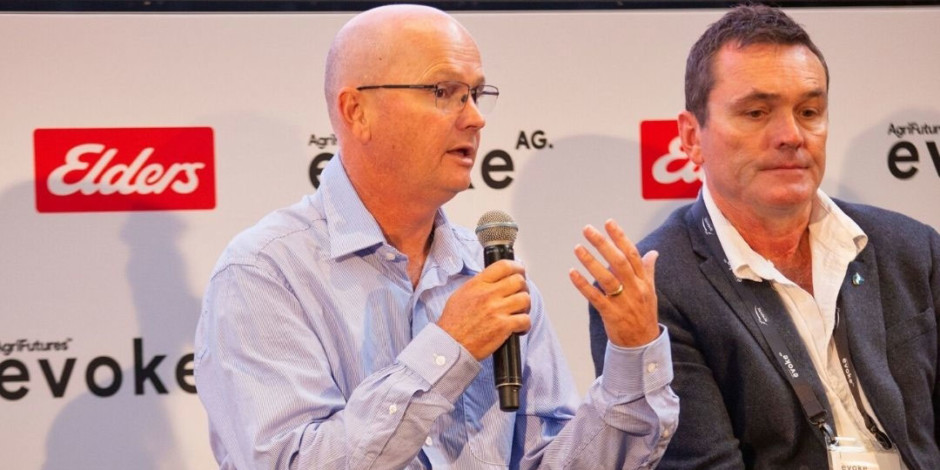Farm innovation with Mark Mortimer
Mark Mortimer is one of the most innovative farmers you will come across. When he walks out the door to go and work on his farm each day, he has a computer bag over his shoulder. He has a real passion for data collection, and has used it to improve his Merino Stud, year on year.

Mark is a third generation farmer, he runs a Merino stud called Centre Plus. He’s an innovative farmer and there isn’t a problem too big or too small, that he isn’t willing to try and solve or even build a solution to.
If you look through his Twitter account, @sheepgeekCP, you’ll see some of his proud inventions. He’s constructed his own five way sheep drafter, he has set up a number of sensors measuring water trough levels for livestock, he designed his own genetic software program which has helped him continually improve his Merino stud over the years, and he’s appeared on ABC inventors for a solution he came up with to help to identify the pedigree of lambs to their mothers.
Mark will be the first to admit that he has a shed full of ideas that haven’t always worked out, but that doesn’t stop his curiosity to innovate.
“I’d happily lock myself away in the shed with a welder, bits and pieces and a computer and make stuff every day. But obviously that doesn’t run the farm,” said Mark.
This year has been an improvement on the last few of years, with 2017-2019 being very challenging drought years for his area.
“The season at the moment is very good. I haven’t had feed on the farm like this since mid-2016.”
During the dry period, Mark had to reduce his stock numbers by 30 per cent which was not an easy decision.
“Being a stud breeder, it’s a little bit different to a commercial farm. I have ram clients that expect a certain number of animals each year, and like any business if you suddenly don’t supply your customers and tell them they have to go somewhere else, you may not get them back. So we reduced our numbers in line to the reduction of product our clients need, that meant I was able to reduce my numbers by 30 per cent, but that was as low as I could go.”
Mark’s passion to capture data and continually improve his flock has been a hallmark of his career. When electronic tags first came on the scene, he designed his own software program to meet his needs and better utilise the technology.
“At the time, in the early 2000s when we moved to electronic tags, there was sheep recording software but electronic tags were very new and there wasn’t any software that integrated with electronic tags. So that was the motivation to start.”
Nowadays, it’s a new type of smart tag technology that AWI have been trialling on sheep. The tags are currently being trialled and look to be able to help establish maternal pedigree, identify health complications, and track animal movements.
According to Mark, the data capturing capability of these smart tags will give farmers greater insights into their sheep activity and assist with making better decisions and something he looks forward to using into the future.
“That’s the ultimate in telling me something about my sheep. That’s 700 pieces of information about my sheep every minute, so that ticks all my boxes and is where I want to get to.”
When asked to as why agtech is lagging in the livestock industry, Mark points to a few different reasons.
“If you’re going to build technology that deals with an animal, an animal is a very complex machine in itself. If I give you an animal, and I want you to build me a technology, that animal has a mind of its own and it runs all over the place.”
“There’s also economy of scale gaps. The machinery that gets sold into your cropping industries are worth lots of money, if you can add technology that makes that better, there’s a much bigger margin you can work with. The margins on livestock are much lower, so you’ve got much lower margins to work with to make profit from the tech that you’re selling.”
Mark is seeing DNA testing and the use of genomics are technologies as beneficial and helping improve his own sheep flock
However, at the present, the cost of measuring genomics presents a barrier for adoption for other sheep farmers. One use of DNA testing is to obtain the pedigree information. Mark says that DNA pedigree tests are around $21.50, but for him to capture the pedigree in the paddock he works this out to be $12.50. Despite the cost barrier, Mark does use DNA testing to give him information in other areas.
“The real power is not just finding faults, but we can use that DNA to assess all the traits of the animals. It’s enabled me to start using six month old rams, which the earlier you can use superior genetics the faster you can go. So I can use unmeasured young animals but I’ll know how much wool they’ll cut, what micron that wool will be, what their growth rate will be, what their worm resistance will be.”
In the future he sees this giving us valuable insights at the consumer level.
“Genomics will also tell me how nice those animals will be to eat, so how tender the meat is, how juicy that meat is, because historically there was only one way to work that out and that was to put them across the dinner plate, and obviously once you’ve done that you can’t go back and use them.”
Listen to the full interview
Enjoyed this story? Want to learn more about the Asia Pacific region’s innovative agrifood tech ecosystem? Sign up for our newsletter here and receive fresh stories about global leaders, farmers, startups and innovators driving collaborative change.
